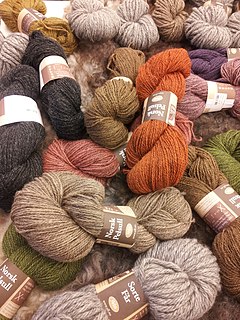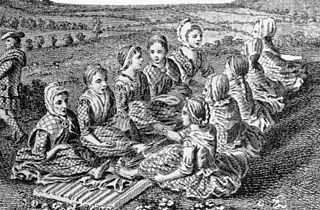
Wool is the textile fiber obtained from sheep and other animals, including cashmere and mohair from goats, qiviut from muskoxen, hide and fur clothing from bison, angora from rabbits, and other types of wool from camelids.

A textile is a flexible material made by creating an interlocking network of yarns or threads, which are produced by spinning raw fibres into long and twisted lengths. Textiles are then formed by weaving, knitting, crocheting, knotting, tatting, felting, bonding or braiding these yarns together.

Yarn is a long continuous length of interlocked fibres, suitable for use in the production of textiles, sewing, crocheting, knitting, weaving, embroidery, or ropemaking. Thread is a type of yarn intended for sewing by hand or machine. Modern manufactured sewing threads may be finished with wax or other lubricants to withstand the stresses involved in sewing. Embroidery threads are yarns specifically designed for needlework.
A sack usually refers to a rectangular-shaped bag.

Fulling, also known as tucking or walking, is a step in woollen clothmaking which involves the cleansing of cloth to eliminate oils, dirt, and other impurities, and to make it thicker. The practice died out with the modernisation of the industrial revolution.

Mineral wool is any fibrous material formed by spinning or drawing molten mineral or rock materials such as slag and ceramics.

Cashmere wool, usually simply known as cashmere, is a fiber obtained from cashmere goats, pashmina goats, and some other breeds of goat. It has been used to make yarn, textiles and clothing for hundreds of years. Cashmere is closely associated with the Kashmir shawl, the word "cashmere" deriving from an anglicisation of Kashmir when the Kashmir shawl reached Europe in the 19th century from Colonial India. Common usage defines the fiber as wool, but it is finer, stronger, lighter, softer and approximately three times more insulating than sheep wool. Both the soft undercoat and the guard hairs may be used; the softer hair is reserved for textiles, while the coarse guard hair is used for brushes and other non-apparel purposes.

The Merino is one of the most historically relevant and economically influential breeds of sheep, much prized for its wool. The origins of the breed are the subject of debate, with alternatives of it originating in flocks transferred from Morocco as early as the 12th century, originating and being improved in Extremadura in southwestern Spain, in the 12th and 13th centuries or from the selective crossbreeding of Spanish ewes with imported rams at several different periods. It was instrumental in the economic development of 15th and 16th century Spain, which initially held a monopoly on the trade in its wool. Since the end of the 18th century, the breed was further refined in New Zealand and Australia, giving rise to the modern Merino.
Long underwear, also called long johns or thermal underwear, is a style of two-piece underwear with long legs and long sleeves that is normally worn during cold weather. It is commonly worn by people under their clothes in cold countries.
Wool is the textile fibre obtained from sheep.

Sheep shearing is the process by which the woollen fleece of a sheep is cut off. The person who removes the sheep's wool is called a shearer. Typically each adult sheep is shorn once each year. The annual shearing most often occurs in a shearing shed, a facility especially designed to process often hundreds and sometimes more than 3,000 sheep per day.

Batiste is a fine cloth made from cotton, wool, polyester, or a blend, and the softest of the lightweight opaque fabrics.

Gay City State Park is a public recreation area on the Blackledge River in the towns of Hebron and Bolton, Connecticut. The state park occupies 1,569 acres (635 ha) bordering Meshomasic State Forest and is accessible from State Route 85. In addition to its deep forest, millpond, and marshland, the park bears trace remnants of the mill town that occupied the site for most of the 19th century. The park is managed by the Connecticut Department of Energy and Environmental Protection.

Sheep are quadrupedal, ruminant mammals typically kept as livestock. Like most ruminants, sheep are members of the order Artiodactyla, the even-toed ungulates. Although the name sheep applies to many species in the genus Ovis, in everyday usage it almost always refers to Ovis aries. Numbering a little over one billion, domestic sheep are also the most numerous species of sheep. An adult female is referred to as a ewe, an intact male as a ram, occasionally a tup, a castrated male as a wether, and a young sheep as a lamb.
Wooler is a surname. People with this surname include:

The Monmouth cap was an item of woollen headgear fashionable between the 15th and 18th centuries, and associated with the town of Monmouth in south east Wales. The knitted round caps were used by both soldiers and sailors, and they were widely exported.
Wooller is a surname. Notable people with the surname include:
MacArthur or Macarthur is a surname, originating with the Scottish Clan MacArthur and now spread through English-speaking countries. Notable people with the surname include:











